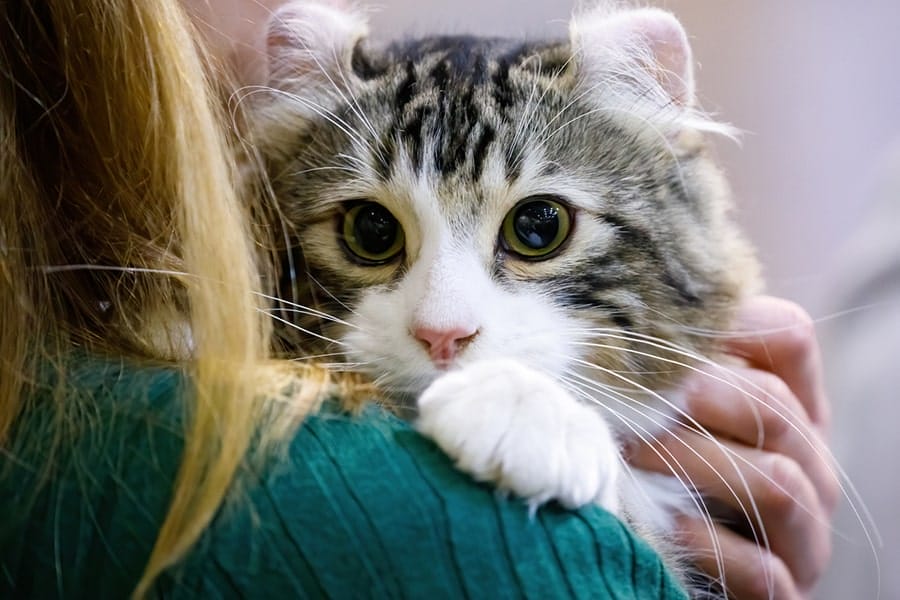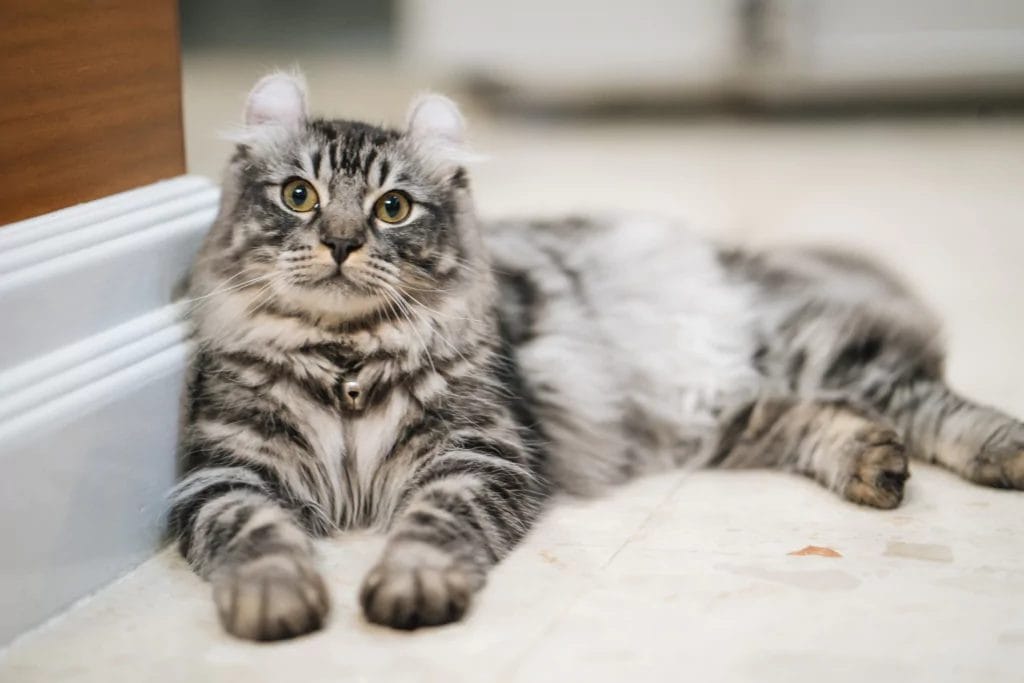The American Curl cat is a distinct breed characterized by their unique curled ears, which give them a whimsical and endearing appearance. These felines have captivated the hearts of many with their friendly dispositions and adaptability as cherished family companions.
Introduction The American Curl Cat Breed
The American Curl cat breed originated in Lakewood, California, in 1981, when a stray cat named Shulamith gave birth to a litter of kittens with naturally curled ears. This unique trait caught the attention of cat fanciers, who recognized the potential for a new breed. Through selective breeding, the American Curl cat emerged as a distinct breed, prized for its distinctive ears and affectionate personality.

Affectionate with Family: ⭐⭐⭐⭐⭐
Amount of Shedding: ⭐⭐⭐
General Health: ⭐⭐⭐⭐
Potential for Playfulness: ⭐⭐⭐⭐⭐
Tendency to Vocalize: ⭐⭐⭐
Kid-Friendly: ⭐⭐⭐⭐
Friendly Toward Strangers: ⭐⭐⭐⭐
Easy to Groom: ⭐⭐⭐⭐
Intelligence: ⭐⭐⭐⭐
Pet Friendly: ⭐⭐⭐⭐⭐
- Appearance: The American Curl cat is a medium-sized breed with a semi-foreign body type. Their most distinctive feature is their uniquely curled ears, which are firm, rounded, and curl back in an attractive arc.
- Characteristics: Known for their affectionate and people-oriented personalities, American Curl cats are highly adaptable and thrive in various living environments.
- Popularity: While not as widely recognized as some other breeds, the American Curl cat has gained a steady following among cat fanciers who appreciate their unique appearance and friendly nature.
- Temperament: These cats are known for their outgoing, social, and loyal temperaments, making them excellent companions for families and individuals alike.
- Lifespan: The average lifespan of an American Curl cat is 12 to 16 years.
- Coat color: American Curl cats come in a variety of colors and patterns, including solid, tabby, calico, and bi-color.
The American Curl cat is an original breed developed through selective breeding of a naturally occurring genetic mutation. Some examples of other original cat breeds include the Scottish Fold, Sphynx, and Devon Rex, while examples of mixed cat breeds include the Chausie (Abyssinian and Jungle Cat) and the Savannah (Domestic cat and Serval).
How to take care of an American Curl cat
Food:
- High-quality commercial cat food formulated for their specific life stage (kitten, adult, or senior) to ensure proper nutrition.
- Wet food, in addition to dry kibble, can provide added moisture and variety to their diet.
- Occasional treats, such as cooked chicken or fish, can be offered in moderation as a reward or supplement.
Environment:
- Access to vertical space, such as cat trees or shelves, to accommodate their agility and climbing tendencies.
- Scratching posts or pads to provide an appropriate outlet for their natural scratching behavior.
- Interactive toys and puzzles to stimulate their minds and satisfy their playful nature.
Grooming:
- Regular brushing to remove loose hair and reduce shedding, especially during seasonal changes.
- Trimming nails regularly to prevent overgrowth and potential scratching issues.
- Ear cleaning and monitoring to maintain ear health and prevent buildup or infections.

Take care method: Provide plenty of playtime, interactive toys, and positive reinforcement training to keep American Curl cats engaged, stimulated, and well-behaved.
How to buy/adopt an American Curl cat
- Locations of American Curl cat’s popularity The American Curl cat breed is primarily popular in the United States, where it originated, as well as in Canada and parts of Europe.
- Average price for an American Curl cat The average price for an American Curl cat can range from $800 to $1,500, depending on factors such as breeder reputation, pedigree, and location.
- Community for American Curl cat adoption/rescue community United Kingdom: The Governing Council of the Cat Fancy (GCCF) United States: American Curl Cat Association (ACCA), The Cat Fanciers’ Association (CFA) Canada: Canadian Cat Association (CCA)
What to check before adopting/buying
- General health: Ensure the kitten or cat appears healthy, alert, and active, with no signs of illness or abnormalities.
- Vaccinate status: Verify that the kitten or cat has received the necessary vaccinations according to their age and local regulations.
- Medical history: Request and review the cat’s medical records, including any health issues, treatments, or genetic conditions.
How to prepare for an American Curl cat’s life
- Be prepared for a loyal, affectionate, and playful companion.
- Understand their unique grooming needs and provide regular care.
- Offer a stimulating environment with toys, scratching posts, and vertical spaces.
How to take care
Provide a balanced diet of high-quality cat food, a safe and enriched living environment, regular grooming, and plenty of playtime and mental stimulation. Positive reinforcement training can also help foster good behavior and strengthen the bond between the cat and its owner.
Essential equipment for caring:
- Cat tree or scratching posts
- Litter box and litter
- Food and water bowls
- Toys, including interactive and puzzle toys
Common diseases in American Curl cats:
- Ear infections (due to their unique ear shape)
- Dental issues (regular dental care is important)
- Obesity (proper diet and exercise are crucial) Prevention: Regular veterinary check-ups, proper grooming, and a balanced diet can help prevent or manage these conditions.

Necessary vaccines for American Curl cats:
- Feline distemper (panleukopenia)
- Feline calicivirus
- Feline rhinotracheitis (herpesvirus)
- Rabies (as per local regulations)
Common names for American Curl cats
When choosing a name for an American Curl cat, consider names that reflect their unique appearance, personality traits, or origins.
Suggested names: Curly, Swirl, Twister, Charmer, Snuggle, Cali (short for California), and Shulie (after the breed’s founding cat, Shulamith).
“Do American Curl cats like going out rather than staying home?”
Cats are generally content as indoor pets but can enjoy supervised outdoor access or walks on a leash.
“Is an American Curl cat a smart cat?”
Yes, cats are known for their intelligence and can be easily trained with positive reinforcement methods.
“How many types of American Curl cats are there?”
There are two types: the traditional Curl and the semi-Curl, which have varying degrees of ear curvature.
“How do I stop my American Curl cat from biting?”
Provide plenty of playtime and appropriate toys to redirect their biting behavior, and use positive reinforcement training to discourage biting.
“How do I stop my American Curl cat from scratching?”
Provide scratching posts and trim their nails regularly to minimize scratching on furniture or surfaces.
“How do I socialize and raise a friendly American Curl cat?”
Early socialization and positive interactions with people and other pets are crucial for developing a well-adjusted and friendly cat.
“How do I train my American Curl cat?”
Cats are intelligent and respond well to positive reinforcement training methods, such as clicker training and reward-based techniques.
“How often should I have my American Curl cat’s health checked by a vet?”
Regular annual check-ups and preventive care visits are recommended for cats to monitor their health and address any concerns.
“Are American Curl cats good family pets?”
Yes, cats are known for their affectionate and adaptable nature, making them excellent family companions.
“Are American Curl cats good with children?”
With proper supervision and socialization, cats can be great companions for children and are generally patient and gentle.
“Are cats good with other animals?”
Cats can coexist with other pets, such as dogs or cats, when properly introduced and socialized from a young age.
“Can cats cause allergies?”
While no breed is entirely hypoallergenic, cats produce moderate levels of allergens, making them a potential option for some individuals with mild allergies.
“Are cats ferocious?”
No, cats are known for their friendly and affectionate temperaments and are not typically aggressive or ferocious.
“Do cats have a lot of hair loss problems?”
Cats have a moderate shedding level, but regular grooming can help manage shedding and prevent excessive hair loss.
Captivated by their independent spirit and mesmerizing eyes, cats have become cherished companions in countless homes. Whether you’re a seasoned cat owner or a curious newcomer, unraveling the world of felines can be both fascinating and rewarding. Our website delves into the captivating realm of cats, offering a treasure trove of information on all things feline. Explore a diverse array of cat breeds, each boasting unique personalities and appearances.
Discover essential tips on cat training, cat care ensuring your furry friend thrives with proper cat diet nutrition & cat food and attentive healthcare. Learn about common feline diseases and preventive measures to keep your cat healthy and happy. Dive deeper into the fascinating world of cats and embark on a journey of purrs and companionship. Visit our website today and unlock a wealth of knowledge about cat health problems captivating creatures!

